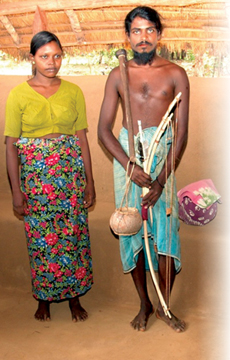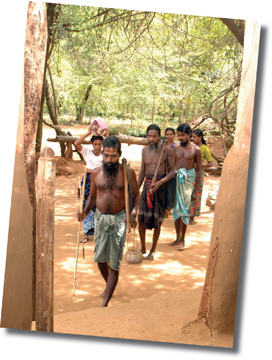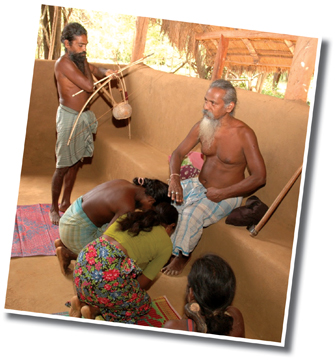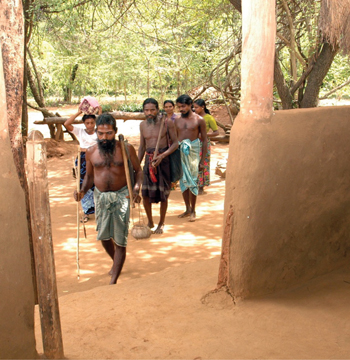 When
the Vedda young fall in love... When
the Vedda young fall in love...
...and get married:
by Husna Inayathullah
Dating, courting, falling in love... getting married... Heady stuff
that turns romance novels into bestsellers and movies into box office
hits, is an intriguing ritual in the jungles of Dambana, when the Vedda
young fall in love.
Courting is a dance of subterfuge with the Kekula and Kekuli (Vedda
boy and girl) creating opportunities for their rendezvous in the jungle.
Kekula while on his way to hunting or gathering wild honey, Kekuli while
going for a bath in the river, collect firewood or while plucking fruits
from trees.
Love is a beautiful feeling, an action, an experience, no matter who
you are or where you are. And it is no different for this young Vedda
couple in Kotabakkiniya, deep in the jungles in Dambana.
The Kekula and Kekuli who fell in love on a jungle footpath, had been
meeting each other deep in the forest for about a year, before the
Kekuli decided to share their secret with her Thathilai Aththo (father).
The affair
Thathilai Aththo, advises the Kekula to apprise to his parents about
the affair and get their permission to be away from home for three
months. This is part of the Vedda courtship ritual where the Kekula has
to stay with the Kekuli's father for three months, proving himself man
enough to take on the responsibilities of being husband and father. He
is given a range of activities to perform, testing his skills, talents
and intelligence.
The three-month period, while literally a probation period to check
the Kekula's suitability as a husband, with many trials and tests to
overcome, is also a testing tightrope walk on future father-in-law -
son-in-law relationship.
  Thathilai
Aththo tests the Kekula with many skills, including hunting, gathering
honey, knowledge about the way of the jungle, skills with the bow and
arrow and how he handles the varied dangers of forest life. Thathilai
Aththo tests the Kekula with many skills, including hunting, gathering
honey, knowledge about the way of the jungle, skills with the bow and
arrow and how he handles the varied dangers of forest life.
In this three months if the Thathilai Aththo finds the Kekula
suitable to marry his daughter and if he is happy with his skills and
talents, he approves for the marriage to go ahead takes the necessary
steps to make discuss it with the Kekula's family.
Livelihood skills
The Vedda community has a caste system, but it is usually brushed
aside when it comes to marriages, with priority being given to
livelihood skills.
According to the traditions of the Vedda community, all young Vedda
couples need the permission of the Vedda's leader, Vishvakeerthi
Wanaspathi Uru Walige Wannila Aththo to get married. In this instance
the Kekula and the Kekuli when to meet the tribal leader in the company
of their parents and elders, taking a huge gift basket for the leader in
order to get a warm welcome. The basket contained bee honey, kurakkan
rotty, kurakkan flour, sweetmeats such as kokis, kevum, maize and dried
hunted meat, all wrapped beautifully in traditional style. Such goods
are considered very valuable gifts to receive the leader's blessing and
permission.
The parents tell the leader about the couple. In Vedda's language
they say, ''Me ettho mangachchawa me eththange kekula me etthige
kakulita mana pojja thibenawa. Nayka etthoge manapa pojje thibeynawanam
me eththo dekama wiwana pojjata manapa pajja thibbenawa,'' meaning they
like to give their daughter and son in marriage. Thereafter the leader
asks the couple whether they like each other.
A family life
 After
the leader's permission for the marriage is obtained, the bride's
parents present a winnowing fan, an axe, bow and arrows, a puppy and a
mat to the couple. They consider those to be the major necessities to
start a family life. After
the leader's permission for the marriage is obtained, the bride's
parents present a winnowing fan, an axe, bow and arrows, a puppy and a
mat to the couple. They consider those to be the major necessities to
start a family life.
The wedding present from the Kekula's family is essential items that
would enable the new couple to live comfortably for about three weeks.
Thereafter it becomes the duty of the Kekula to make his own living. He
is told by the father-in-law to find a suitable place inside the forest
and build a hut of their liking.
The Kekula has to make a home from leaves and barks for him and his
love to live together after marriage.
After Wannila Aththo grants permission for the marriage but the
marriage takes place and the couple start living under one roof, they
are taken to the Danu Muttak who is considered the wise and intelligent
person in the forest. The Danu Muttak advices the couple on how to start
a fresh and beautiful life and how to plan for a happy future. He is
given a tray of sweetmeats, a gesture of happiness by the couple's
parents.
They go back to Wannila Aththo for the second time with a Kadak
Kachchuwa, which is gift pack with sweetmeats. The whole village is
given sweetmeats as part of the celebrations. There are no ceremonies,
grand functions and pretty dresses. The wedding, as in the life of the
Veddas is a very simple affair.
The marriage and family life of the Veddas is simple and
uncomplicated. There is no lavish spending, and the suitability of a boy
to be a husband is not determined by the wealth he owns, but his
strength as a hunter gatherer. Soon after a marriage if the village is
able to hunt well, they believe it is due to the luck of the newly
wedded couple.
The blessings and the happiness of the kale ponja which means the
forest, suwande ponj, a which means the sweet fragrance from the flowers
and the chappi, which is the beautiful songs of the birds surround the
new couple. They bless them to live a healthy and a long life.
|

